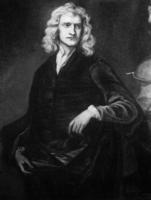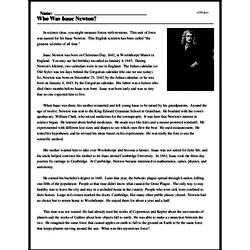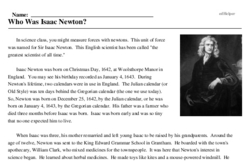Who Was Isaac Newton?
In science class, you might measure forces with newtons. This unit of force was named for Sir Isaac Newton. This English scientist has been called "the greatest scientist of all time."
Isaac Newton was born on Christmas Day, 1642, at Woolsthorpe Manor in England. You may see his birthday recorded as January 4, 1643. During Newton's lifetime, two calendars were in use in England. The Julian calendar (or Old Style) was ten days behind the Gregorian calendar (the one we use today). So, Newton was born on December 25, 1642, by the Julian calendar, or he was born on January 4, 1643, by the Gregorian calendar. His father was a farmer who died three months before Isaac was born. Isaac was born early and was so tiny that no one expected him to live.
When Isaac was three, his mother remarried and left young Isaac to be raised by his grandparents. Around the age of twelve, Newton was sent to the King Edward Grammar School in Grantham. He boarded with the town's apothecary, William Clark, who mixed medicines for the townspeople. It was here that Newton's interest in science began. He learned about herbal medicines. He made toys like kites and a mouse-powered windmill. He experimented with different kite sizes and shapes to see which ones flew the best. He used measurement. He tested his hypotheses, and he revised his ideas based on his experiments. He was really the first to use the scientific method.
His mother wanted him to take over Woolsthorpe and become a farmer. Isaac was not suited for farm life, and his uncle helped convince his mother to let Isaac attend Cambridge University. In 1661, Isaac took the three-day journey by carriage to Cambridge. At Cambridge, Newton became interested in mathematics, optics, physics, and astronomy.
He earned his bachelor's degree in 1665. Later that year, the bubonic plague spread through London, killing one-fifth of the population. People at that time didn't know what caused the Great Plague. The only way to stay healthy was to leave the city and stay in a secluded home in the country. People who were sick were confined to their homes. Large red crosses marked the doors. Cambridge, like many other public places, closed. Newton had no choice but to return home to Woolsthorpe. He stayed there for about a year and a half.




